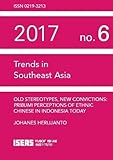Old Stereotypes, New Convictions : Pribumi Perceptions of Ethnic Chinese in Indonesia Today / Johanes Herlijanto.
Material type: TextPublisher: Singapore : ISEAS Publishing, [2017]Copyright date: ©2017Description: 1 online resource (26 p.)Content type:
TextPublisher: Singapore : ISEAS Publishing, [2017]Copyright date: ©2017Description: 1 online resource (26 p.)Content type: - 9789814786348
- 9789814786355
- online - DeGruyter
- Issued also in print.
| Item type | Current library | Call number | URL | Status | Notes | Barcode | |
|---|---|---|---|---|---|---|---|
 eBook
eBook
|
Biblioteca "Angelicum" Pont. Univ. S.Tommaso d'Aquino Nuvola online | online - DeGruyter (Browse shelf(Opens below)) | Online access | Not for loan (Accesso limitato) | Accesso per gli utenti autorizzati / Access for authorized users | (dgr)9789814786355 |
Browsing Biblioteca "Angelicum" Pont. Univ. S.Tommaso d'Aquino shelves, Shelving location: Nuvola online Close shelf browser (Hides shelf browser)

|

|

|

|

|

|

|
||
| online - DeGruyter Citizens, Civil Society and Heritage-making in Asia / | online - DeGruyter Framing Asian Studies : Geopolitics and Institutions / | online - DeGruyter The Natunas : Territorial Integrity in the Forefront of Indonesia-China Relations / | online - DeGruyter Old Stereotypes, New Convictions : Pribumi Perceptions of Ethnic Chinese in Indonesia Today / | online - DeGruyter The Traditionalist Response to Wahhabi-Salafism in Batam / | online - DeGruyter Rowing Against the Tide? : Batam's Economic Fortunes in Today's Indonesia / | online - DeGruyter Records, Recoveries, Remnants and Inter-Asian Interconnections : Decoding Cultural Heritage / |
Frontmatter -- FOREWORD -- Old Stereotypes, New Convictions: Pribumi Perceptions of Ethnic Chinese in Indonesia Today. EXECUTIVE SUMMARY -- Old Stereotypes, New Convictions: Pribumi Perceptions of Ethnic Chinese in Indonesia Today. INTRODUCTION -- THE CHANGING POSITION OF THE ETHNIC CHINESE -- PERSISTENT SENTIMENTS AGAINST THE ETHNIC CHINESE -- CONCLUSION
restricted access online access with authorization star
http://purl.org/coar/access_right/c_16ec
Despite improvements in the position of ethnic Chinese in the reformasi era, critical and negative perceptions of them persist among prominent pribumi personalities, particularly in recent years. These include leaders of several Islamic organizations, nationalists who harbour suspicions about foreign powers, and some who were in mid-career and/or were well placed in the last years of the Suharto era. This latter group consists of retired senior military officers, senior scholars, as well as current and former senior government officials. The ethnic Chinese are often portrayed as outsiders who are already dominant economically, and who are trying to be politically dominant as well. Furthermore, it is often claimed that ethnic Chinese tend to be loyal towards China. At the same time, there are others, including politicians affiliated with pro-government political parties, high-ranking officials, leaders of NGOs sympathetic to President Jokowi, as well as advocates of multiculturalism (many of whom are scholars and Muslim leaders), who believe that Chinese Indonesians are first and foremost Indonesians. The evidence they cite to support this belief varies, from past heroic actions by ethnic Chinese to the identity constructs of Chinese Indonesians, which is usually based on Indonesia or some Indonesian region.
Issued also in print.
Mode of access: Internet via World Wide Web.
In English.
Description based on online resource; title from PDF title page (publisher's Web site, viewed 24. Aug 2021)


